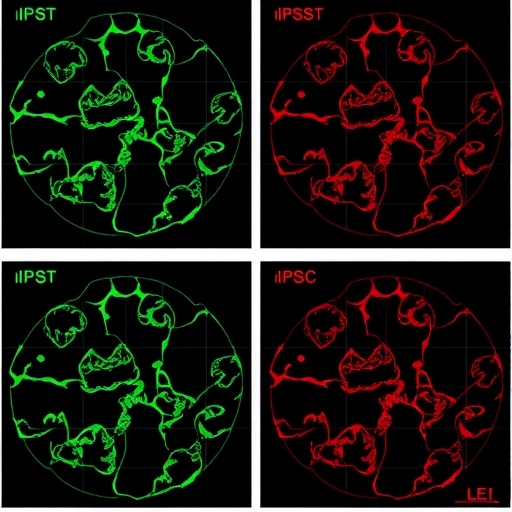In a groundbreaking advancement that holds promise for the treatment of recurrent head and neck cancer, researchers have unveiled the results of a pioneering phase 1 clinical trial employing allogeneic induced pluripotent stem cell (iPSC)-derived invariant natural killer T (iNKT) cells. This innovative therapeutic strategy leverages cutting-edge stem cell technology combined with the unique immunological functions of iNKT cells, opening new horizons in cancer immunotherapy.
Head and neck cancers represent a complex group of malignancies notorious for their aggressive nature and high recurrence rates. Conventional treatments such as surgery, radiation, and chemotherapy often fall short, especially when cancer returns, necessitating novel treatment modalities that can surmount therapy resistance. The introduction of iPSC-derived immune cell therapies has emerged as a beacon of hope.
The trial conducted by Iinuma, Kurokawa, Aoki, and colleagues, as recently published in Nature Communications in 2025, explored the safety and efficacy of allogeneic iNKT cells generated from iPSCs. Unlike autologous therapies, which use a patient’s own cells, allogeneic therapies utilize cells from healthy donors, enabling the creation of “off-the-shelf” immunotherapies that can be produced at scale and administered without delay.
iPSCs represent a revolutionary cell source in regenerative medicine. These pluripotent cells can differentiate into virtually any cell type, providing an inexhaustible supply of functional immune cells. By meticulously directing iPSCs to differentiate into iNKT cells—a specialized subset of T lymphocytes known for their rapid response to malignancies and capacity to stimulate both innate and adaptive immunity—the researchers engineered a potent anti-cancer cellular therapy.
To address the immunological challenges posed by allogeneic cell therapy, such as graft-versus-host disease (GVHD) and immune rejection, the team employed sophisticated genetic engineering and cell selection protocols. These processes ensured that the iPSC-derived iNKT cells retain their tumor recognition capabilities while minimizing immunogenicity, thus enhancing their safety profile.
The phase 1 trial enrolled patients with recurrent head and neck squamous cell carcinoma who had exhausted standard treatment options. The primary objectives were to evaluate safety, determine optimal dosing regimens, and obtain preliminary data on therapeutic efficacy. Participants received multiple infusions of the allogeneic iNKT cells and were closely monitored for adverse events and clinical responses.
Results from the trial were promising, demonstrating that the iPSC-derived iNKT cells were well tolerated with no severe immune-related adverse effects reported. Importantly, the treatment elicited measurable anti-tumor activity, with several patients exhibiting partial responses or stable disease over extended follow-up periods. These outcomes suggest a favorable therapeutic index and potential clinical benefit in a challenging patient population.
At the molecular level, analyses of post-infusion tumor biopsies and peripheral blood samples revealed robust activation of immune effector pathways, including increased cytotoxic T lymphocyte infiltration and upregulation of pro-inflammatory cytokines. This indicates that the administered iNKT cells not only exert direct tumoricidal effects but also modulate the tumor microenvironment to enhance endogenous anti-cancer immunity.
The study also highlighted the scalability and reproducibility advantages of iPSC technology. Large-scale manufacturing protocols developed for this trial achieved consistent production of high-purity iNKT cells with preserved functionality. This scalability overcomes one of the significant barriers in adoptive cell therapy, potentially reducing costs and increasing patient access.
Beyond head and neck cancer, the principles demonstrated in this trial may extend to a broader spectrum of malignancies and immunological disorders. iNKT cells possess a unique ability to recognize glycolipid antigens presented by CD1d molecules, a pathway distinct from conventional major histocompatibility complex (MHC)-restricted T cell recognition, making them versatile effectors against diverse cancer types.
The integration of iPSC technology with immune cell therapy represents a paradigm shift, combining the benefits of regenerative medicine with cancer immunology. By harnessing the plasticity of iPSCs and the potent immunomodulatory effects of iNKT cells, this approach circumvents limitations of current therapies such as donor variability, limited cell availability, and protracted manufacturing timelines.
Despite these encouraging results, several challenges remain to be addressed in the subsequent phases of clinical development. These include optimizing dosing schedules, enhancing in vivo persistence and trafficking of infused cells, and combining iNKT cell therapy with other modalities such as checkpoint inhibitors or radiation to maximize efficacy.
Furthermore, mechanistic studies into the interplay between allogeneic iNKT cells and the host immune system are crucial to unravel the long-term immunological consequences, including potential development of tolerance or immune modulation that could influence treatment durability.
Experts in the field view this study as a critical step toward establishing universal, off-the-shelf cellular immunotherapies that can be rapidly deployed against refractory cancers. The capacity to generate genetically defined, functionally robust immune cells from iPSCs heralds a new era of personalized yet scalable cancer treatment options.
In conclusion, the successful demonstration of safety and preliminary efficacy of allogeneic iPSC-derived iNKT cells in recurrent head and neck cancer represents a major milestone. This innovative therapy exemplifies the convergence of stem cell biology, immunotherapy, and precision medicine, offering renewed hope for patients with limited treatment alternatives and setting the stage for transformative advances in oncological care.
As the clinical development progresses, further large-scale trials will be essential to confirm these findings, refine therapeutic protocols, and explore synergistic combinations. The potential impact of off-the-shelf iPSC-derived immune cell therapies could extend beyond cancer, potentially revolutionizing treatments for autoimmune diseases, infectious diseases, and beyond.
The advent of iPSC-derived iNKT cell therapy encapsulates the promise of scientific ingenuity in combatting cancer. It reflects a future where engineered immune cells provide rapid, potent, and accessible therapeutic options, transforming outcomes for patients worldwide and reshaping the landscape of modern medicine.
Subject of Research:
Immune cell therapy using allogeneic iPSC-derived invariant natural killer T (iNKT) cells for the treatment of recurrent head and neck cancer.
Article Title:
Allogeneic iPSC-derived iNKT cells in recurrent head and neck cancer: a phase 1 trial.
Article References:
Iinuma, T., Kurokawa, T., Aoki, T. et al. Allogeneic iPSC-derived iNKT cells in recurrent head and neck cancer: a phase 1 trial. Nat Commun (2025). https://doi.org/10.1038/s41467-025-66801-w
Image Credits: AI Generated




